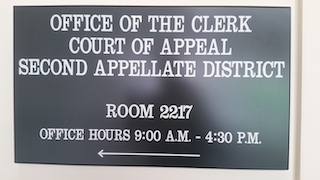No is the answer to the question posed in article title, at least when the appellate court remands with specific orders that the trial court limit its review to the firearm enhancement.
The following summary, however, is significant on two additional issues that anyone interested in knowing more about resentencing should know, particularly in the context of SB 620.
The Gist of this Article: When an appellate court remands a case for the trial court specifically just to review a firearm enhancement under SB 620, the trial court cannot resentence defendant under other new sentencing laws beyond SB 620. This was so in the following case, summarized below, because the case was not remanded for resentencing under Penal Code § 1170.26, which does allow full “resentencing.”
The factual background to the appellate court ruling is important. Gino Cervantes was charged in a six count information stemming from two separate shooting incidents that took place about six months apart in Los Angeles County. In both incidents, Cervantes’ motive for the shooting appeared to be the victims’ romantic interest in a woman Cervantes had dated.
The jury acquitted Cervantes of the willful, deliberate and premeditated attempted murder (Penal Code §§ 664/187) and assault with a stun gun or taser (Penal Code § 244.5(b)) counts.
Cervantes admitted a prior conviction for a strike offense.
The jury convicted Cervantes of assault with a semi-automatic firearm (Penal Code § 245(b)), possession of a firearm by a felon (Penal Code § 29800(a)(1)) and assault with a firearm (Penal Code § 245(a)(2)) and a true finding on the enhancement for personal use of a firearm (Penal Code § 12022.5(a) as to two counts) and personal infliction of great bodily injury (Penal Code § 12022.7(a) on two counts).
The trial court judge sentenced Cervantes to 29 years and four months, including an imposition of ten years for the 12022.5(a) enhancement, which is the maximum of the sentencing triad of 3, 4 or 10 years.
Cervantes appealed his conviction and sentence on multiple grounds to the California Courts of Appeal, Second Appellate District in Los Angeles. This article will limit its scope to his argument that Senate Bill 620 was retroactively effective that “the trial court may strike the firearm enhancements or strike only the punishment for the enhancements.”
 Clerk's Office 2nd Appellate District
Clerk's Office 2nd Appellate District
In response to this argument, as Cervantes’ sentence was not yet final, the Second Appellate District remanded the matter to allow the trial court to exercise its discretion to strike the firearm enhancement under Penal Code § 12022.5(c). See In re Estrada (1965) 63 Cal. 2d 740, 744; People v. Woods (2018) 19 Cal. App. 5th 1080, 1090-1091.
The appellate court, however, held that remand is not required in every instance where a trial court imposed a firearm enhancement before 620’s effective date. If “the record shows that the trial court would not have exercised its discretion even if it believed it could do so, then remand would be an idle act and is not required.” People v. Gamble (2008) 164 Cal. App. 4th 891, 901.
It is significant that counsel for Cervantes did not request that the trial court impose a lesser sentence, i.e., three or four years. Counsel for Cervantes wanted the sentence reduced by ten years, nothing less.
The trial court judge, Thomas Rubinson, declined to exercise his discretion to strike the ten-year firearm enhancement and explained this was because: 1) Cervantes chose to initiate the gun-related violence against multiple people; 2) Cervantes had a lengthy and serious prior criminal history; 3) Cervantes seemed quite ready and eager to use firearms when he felt disrespected or angry; and 4) Cervantes sent at least one person to the hospital with serious medical injuries. Judge Rubinson made it clear that while he would strike the firearm enhancement in a case, this case was not an appropriate one in which to do so.
Christopher Darden, appellate counsel for Cervantes, also asked the trial court to consider striking Cervantes’ prior strike under People v. Superior Court (Romero) (1996) 13 Cal.4th 497. The appellate court declined to do so, as the trial court had considered such a motion in sentencing and declined the motion.
Mr. Darden also argued that the trial court “failed to exercise its informed discretion” in not reconsidering the entire sentence. The Second Appellate District commented that such an argument is based on what Darden “coined” the “full sentencing rule:” that when an appellate court remands a case for resentencing, the trial court may consider the entire sentence. Darden cited to People v. Garner (2016) 244 Cal. App. 4th 1113, 1118 and People v. Hubbard (2018) 27 Cal. App. 5th 9, 13 for this rule. The appellate court distinguished these two cases, noting both were for Proposition 36 resentencing under Penal Code § 1170.126.
The appellate court in Cervantes noted that his sentence was not being remanded under 1170.126, so the “full sentencing rule” would not apply.
We present this summary because this ruling clarifies what many criminal defense attorneys have argued in resentencing – that a trial court can reconsider the full sentence, which is not always possible if the appellate court specified a limited area for reconsideration on remand, and that SB 620 is not always retroactive if the trial courts sentencing made it clear that remand would be “an idle act.”
The citation for the Second Appellate District Court ruling discussed above is People v. Gino Cervantes (2nd App. Dist., 2021) 72 Cal. App. 5th 326, 287 Cal. Rptr. 3d 224.
For more information about resentencing, please click on the following articles:
 Clerk's Office 2nd Appellate District
Clerk's Office 2nd Appellate District